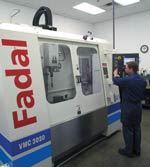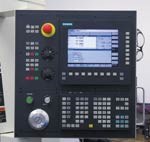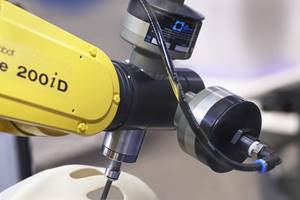High Speed Machining Cuts Moldmaking Cycle Time
The moldmaking department of a manufacturing company demands the same skill and attention to detail as an independent moldmaker does. However, the manufacturing company puts more emphasis on throughput and versatility from moldmaking machines to ensure that molds are ready in time to keep the injection molding machines running and turning out quality products.
Share





The moldmaking department of a manufacturing company demands the same skill and attention to detail as an independent moldmaker does. However, the manufacturing company puts more emphasis on throughput and versatility from moldmaking machines to ensure that molds are ready in time to keep the injection molding machines running and turning out quality products. Typically, the captive moldmaker will not have dedicated moldmaking machines but instead prefers a machine that accommodates 3D contouring as well as drilling, tapping and other general machining operations. These were exactly the problems facing the moldmaking department at KBI, a Valencia, California, manufacturer of CPVC and PVC plastic irrigation, plumbing, industrial and pool/spa valves and fittings.
Until recently, KBI had subcontracted most of its moldmaking operations. But maintaining a competitive edge in the price-sensitive market for thermoplastic valves and fittings required the quality, speed, flexibility and cost control of building molds in-house. Mike Arms, vice president of engineering at KBI, explains, "When I originally started looking, I was considering a moldmaking machine out of Germany. It was a very good machine for high speed milling of contours but very limited in what it would do in the X, Y and Z planes. It had a limited work envelope, and it would not drill or tap. We needed one machine that would do it all—cut mold bases, cavities, holes, inserts and threaded inserts and occasionally machine parts."
KBI purchased a Fadal (Chatsworth, California) Performance Series VMC 3020, featuring heavy duty construction, a 15,000-rpm spindle, Siemens (Elk Grove Village, Illinois) Sinumerik 810D CNC control, chip washdown and auger. Mr. Arms explains, "The German moldmaking machine was double the cost of this Fadal, and it had limited capabilities. With the Fadal VMC, I expected to need some support because the control was new to us. Fadal not only showed us how to use the CNC's ShopMill Operator interface to quickly set up our tooling and workpieces, but the company also showed us how to use the network connectivity to link the machine to our CAD/CAM system. The new design looked as if it would get us the accuracy and throughput that was needed. Because we're not always machining high tolerance surfaces—we do a lot of plain milling and drilling and making some blocks—I needed the versatility that the Fadal promised."
Because all KBI products carry a lifetime warranty against defects, warranty costs are a critical issue. By delivering a smoother surface finish, the VMC 3020 turns out higher quality molds, making parts that fit together better and meet higher test pressures. Mr. Arms says, "We have a list of 136 molds, and they all use replaceable inserts. So we can run a family of products in each mold. From the outside, our products look fairly simple, but they can be very complicated—unless you think several winding cores in different planes at the same time is not complicated. Our molds tend to have a lot of mechanical parts, more than fancy parting lines or contours. Due to the assembly work we do here, the quality has to be exceptional. We get a very good quality surface finish and accuracy. We do a little polishing, usually only after engraving. Most of the handwork is disappearing."
By adding Metacut software to its existing CAD/CAM systems, KBI is able to convert NC programs from point files to CIP Interpolation (3D Arcs programming), reducing the size of its programs and cycle time for contouring operations while increasing accuracy and surface finish smoothness. Similar to NURBS, CIP is a programming technique that is more efficient than conventional linear and circular representation, enabling a reduction in the size of the NC program and providing for smooth contours with smooth transitions between spline segments. Programming with linear blocks creates bottlenecks in the execution of the NC program, historically known in the CNC world as "block processing time." The transition between linear blocks creates velocity steps unable to be followed by the machine tool, which is one of the main reasons that spline programming provides a better surface finish than linear block programming. Geometry of a contour represented by 100 linear blocks can be reduced to as few as five to ten spline blocks. Mr. Arms explains, "We run the mold through my design software Cadkey and Visicad. It has the ability to network, so I transfer the files to my machine operator, and he will write the point-to-point code with Visicam. Then it will be filtered through Metacut, changing the programming to CIP arcs and reducing a 20 MB program down to 2 MB. It smoothes the positional interpolation to an arc, allowing the machine to travel much faster and look ahead much further for potential problems, giving us higher feed and speed rates. Generally, after we have verified it on Metacut, we get 100 percent reliability."
The Fadal VMC 3020 with Siemens 810D control has made it possible to machine molds, as well as take care of the many other operations required of it with high accuracy and throughput. As a result, KBI is able to maintain its competitive advantage and continue to grow. Mr. Arms explains, "Our competition is worldwide, including mainland China, so we have to be competitive. But there are a lot of factors, including quality and reliability. We're a growing company, and we're doing it with technology and productivity. The Fadal and Siemens control help us maintain our commitment to quality and throughput."
Related Content
How to Accelerate Robotic Deburring & Automated Material Removal
Pairing automation with air-driven motors that push cutting tool speeds up to 65,000 RPM with no duty cycle can dramatically improve throughput and improve finishing.
Read MoreRead Next
Registration Now Open for the Precision Machining Technology Show (PMTS) 2025
The precision machining industry’s premier event returns to Cleveland, OH, April 1-3.
Read MoreBuilding Out a Foundation for Student Machinists
Autodesk and Haas have teamed up to produce an introductory course for students that covers the basics of CAD, CAM and CNC while providing them with a portfolio part.
Read MoreSetting Up the Building Blocks for a Digital Factory
Woodward Inc. spent over a year developing an API to connect machines to its digital factory. Caron Engineering’s MiConnect has cut most of this process while also granting the shop greater access to machine information.
Read More
































